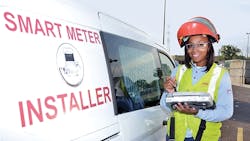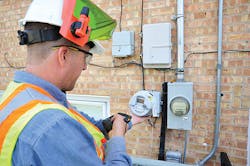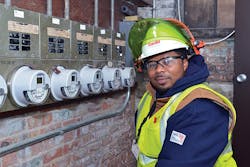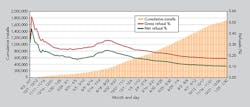Smart Meters Require Outreach and Education
Building on years of service, ComEd is leveraging smart grid improvements — which will provide more reliable service and give customers greater control over their electricity use — to improve customer engagement. In early 2013, the Illinois Energy Infrastructure and Modernization Act authorized a US$2.6 billion investment by ComEd to upgrade and modernize the electric grid, including the installation of approximately 4 million smart meters in homes and businesses across northern Illinois. Recognizing the significant impact of smart meters on customers, ComEd developed an outreach and education strategy to improve customer satisfaction and create a premier customer experience.
Using its own research and benchmarking with other utilities, ComEd found many smart meter projects did not provide enough advanced information to customers, which resulted in a communication gap. In some cases, an absence of customer awareness and knowledge led to issues that resulted in high-profile setbacks and moratoriums on smart meter programs.
To avoid similar instances and provide customers with a positive experience, ComEd built an integrated, staged messaging strategy that delivers appropriate information to all customers as they move through the five stages of the communication process: build awareness, inform, educate, engage and advocate.
Stage 1: Build Awareness
The first stage is to build awareness by promoting the value and benefits of smart meters. At the beginning of this stage, ComEd launches an advertising campaign that includes targeted emails and ads for radio, Chicago Transit Authority rail cars, the web, Facebook and billboards. The campaign calls attention to the savings benefits available through smart meters by providing customers with a sense of empowerment; they can save on their electric bills by taking advantage of meter-related energy-management tools and pricing programs. Customers who are 120 to 60 days from installation receive an insert in their bills and a postcard that introduces customers to the concept of smart meters and serves as notification that smart meters will be installed in their area soon.
During this same stage ComEd’s leadership, customer experience department and external affairs managers engage with municipal and village officials to build awareness through public forums. ComEd representatives attend community events in areas where smart meters are being installed to increase awareness and answer questions. At planned events, ComEd deploys its mascot, Marty the Smart Meter, to attract customers to the utility’s exhibit space, where they can learn more about smart meter installations and benefits.
In areas without scheduled community events, ComEd deploys a branded outreach and education truck to create events in areas where smart meters are being installed. Ambassadors traveling in the truck provide smart meter education materials to customers and answer customer questions. ComEd’s communications team also provides press releases and works hand in hand with regional and local media on key updates about the smart meter program.
Stage 2: Inform
The second stage is to inform customers about the benefits of smart meters and provide details on the timing of installation. In this stage, customers who are 45 to 7 days from installation receive two communications to prepare them for their smart meter.
Customers first receive the preinstallation letter that tells them what to expect on the day of installation. This letter includes frequently asked questions to provide more information about the program and to reiterate the benefits made available in previous mailings. According to the Blackstone Group’s smart meter installation satisfaction survey, the preinstallation letter is the most memorable of ComEd’s smart meter communications. More than two-thirds of respondents recall the letter as the way they first learned their home would receive a smart meter.
The second communication is an automated phone call that notifies the customer ComEd will install the smart meter at their home within the next seven days. It also prompts the customer to contact the utility’s smart meter call center to schedule an appointment if they need to allow access to the meter.
During this same stage, ComEd deploys street teams in high-traffic areas, such as train stations, downtown areas and malls. The street teams use grassroots marketing and distribute flyers, brochures and giveaways as a way to attract customers so they can answer their smart meter-related questions.
Stage 3: Educate
The third stage is to educate customers to ensure they understand how to manage their electricity usage using the information smart meters provide. In this stage, smart meters are installed at customer homes. On the day of installation, ComEd technicians are trained to knock on doors and engage with every customer who may have a question. This strategy has rated favorably among ComEd customers. According to the Blackstone Group’s smart meter installation satisfaction survey, 94% of customers were satisfied with the door knock and 96% of customers were satisfied with the conversation they had with the technician.
After technicians complete the installation, they leave an informational door hanger notifying the customer about the successful exchange and make customers aware of the energy-management tools and programs available to help reduce electricity usage and save money. In this stage, municipal officials also are invited to witness installations so they can understand the customer experience better and receive additional education on the benefits smart meters provide.
Stage 4: Engage
The engage stage starts 30 days after smart meter installation. During this stage, customers receive the first of a series of mailers designed to engage customers in taking advantage of the energy-management tools and programs available.
The first two mailers describe in more detail the online energy-management tools available through My Account as well as the utility’s two optional pricing programs: peak time savings (PTS) and hourly pricing.
Stage 5: Advocate
The final stage is to create smart meter advocates out of ComEd customers and local officials through continued collaboration within communities. Starting 60 days after the installation of smart meters, customers receive more detailed information about hourly pricing and PTS, the latter of which provides customers with a credit on their electric bills for voluntarily using less electricity when it is most in demand. The utility used qualitative research to determine the clarity and comprehension of PTS messaging, the likelihood of opening and the motivation to enroll, as well as the format development for the marketing collateral.
The hourly pricing program is an innovative supply option that gives participants access to the hourly market price of electricity with no markup. By shifting use to times of less demand, participants can take advantage of lower prices. Marketing of the hourly pricing program is focused on select good-fit customers, based on their typical kilowatt-hour usage. Around this time, local officials who were previously educated about these tools and programs are encouraged to become advocates for enrolling in these programs as a way to help constituents manage their electricity usage.
Even well after smart meters are installed, ComEd is dedicated to maintaining a community presence by sponsoring events, attending festivals, hosting workshops and working with all customer segments — such as seniors and families dealing with financial hardships — to ensure everyone is experiencing the benefits smart meters bring.
ComEd also partners with schools in smart meter deployment areas to bring smart meter and energy-management education to students. ComEd’s Student Power program provides teachers with new tools that empower students to use smart meter information to track and manage electricity use at school and home. In its inaugural year in 2014, the program reached more than 7,000 students. In 2015, the program nearly doubled in size by reaching almost 12,000 students.
Focusing on the Customer Experience
ComEd believes providing information and building relationships with its customers is the key to building a successful smart meter project. As part of learnings from its smart meter pilot and other industry benchmarking, ComEd pioneered the smart meter customer experience department to ensure any customer questions, concerns or feedback is addressed effectively with knowledge and care.
The smart meter customer experience department includes the smart meter call center and customer experience (CE) management team, which is dedicated to providing outreach and education to all customers. Because smart meters are technologically advanced and relatively new, it is important for this department to explain complex concerns to customers with respect and empathy. ComEd’s smart meter project is set apart from other utilities because of its innovative customer strategy and implementation of the smart meter customer experience department.
Addressing Customer Concerns
The majority of customer inquiries is handled and resolved within the smart meter call center. It is here ComEd customer service representatives address concerns at the initial point of contact. However, there are certain cases when customers have inquiries that require more research or detailed explanations. In such instances, these inquiries are escalated from the smart meter call center to the CE management team.
Much like any new technology, smart meters have raised concerns with some customers. The most common customer concerns pertain to health, data privacy and security, and overheating meter equipment. In fact, some customers have requested to delay or even refuse the installation of smart meters based on these concerns. These refusal requests are escalated to the CE management team. The CE management team takes time to develop personal connections with each customer and offers information such as fact sheets and third-party trusted research studies to disprove unfounded claims and alleviate customer concerns.
If a customer still wishes to refuse the smart meter, the CE management team will ensure customers understand the Illinois Commerce Commission (ICC) tariff authorizes an additional monthly charge of $21.53 to the customer’s bill to cover costs of manually reading the meter. Also, the CE management team informs customers refusing smart meters that all customers will eventually have smart meters installed at their locations in compliance with ICC requirements.
ComEd follows up with two letters of notifications throughout a four-month period that provide more background on customer smart meter refusals and serve as final notifications before the charges apply. While ComEd has the legal right to charge customers who refuse the smart meter, the smart meter customer experience department’s overriding goal is to resolve any customer issues and install the smart meter.
The CE management team not only works with customers over the phone, but proactively communicates with them through other various forms, including by email and letters, as well as in person at community events, homes or other meetings. For example, when one customer called to refuse the meter and raise concerns on behalf of her neighborhood group, the CE management team offered to attend their upcoming block party to speak with them. The CE team attended the neighborhood block party with the outreach and education truck, circulated smart meter material, addressed the concerns of the group and answered customer questions. Ultimately, the only customer to refuse the smart meter out of the group decided to accept the smart meter installation.
Another example involves a customer who wanted to refuse the meter based on her concern the radio-frequency waves from the smart meter would interfere with her home automation system. The CE management team carefully researched the specifications of the system to ensure there would be no interference. The customer accepted the installation and did not experience any issues.
These are just a few examples of the team’s dedication to their customers. Overall, the smart meter customer experience department has been instrumental in mitigating issues and alleviating customer concerns about smart meters. As a result, the rate at which customers refuse the smart meter is extremely low, standing at 0.10% as of January 2016.
Going Above and Beyond
In addition to the enhanced outreach strategy and implementation of the smart meter customer experience department, ComEd’s smart meter program continues to seek opportunities to go above and beyond customer expectations. For example, in consideration of concerns over the condition of the existing meter fitting, ComEd improved its installation process to include an in-depth inspection of each fitting as well as maintain licensed union electricians on standby. If installers identify the need for repairs to the meter fitting, they will coordinate with electricians to resolve the issue prior to installing the smart meter.
Because these meter fittings are customer-owned equipment, customers normally would be required to hire and pay for their own electrician for these repairs. However, ComEd took this as an opportunity to improve the smart meter customer experience. These repairs are now included as part of the ICC-approved deployment plan, and as a result, repairs are made at no direct cost to the customer.
To further alleviate customer concerns about meter equipment safety, ComEd became the first utility to have its smart meters certified by Underwriters Laboratories, which is a safety organization approved by the U.S. Occupational Safety and Health Administration. Because Underwriters Laboratories provides testing for many other consumer products, this certification has resonated with customers and provided an improved level of comfort with smart meters.
Keeping Focus
Establishing outreach and education strategies for a large-scale implementation program affecting approximately 4 million customers is an intricate process. By keeping its focus on building a premier customer experience, ComEd’s smart meter program has employed unique practices that have yielded a high customer satisfaction rate. According to the Blackstone survey, 92% of ComEd’s customers are satisfied with the entire installation process, including all activities leading up to and following the smart meter installation.
Laura Basili is manager of smart grid outreach and education at ComEd. She is responsible for leading the utility’s strategic marketing program to build awareness and engagement of smart grid product and service offerings. Basili joined ComEd in 2008 and has a background in marketing communications and branding expertise. She holds a bachelor’s degree in communications from Northwestern University.
Giulian Ferruggio ([email protected]) is an associate business analyst in the AMI customer experience department at ComEd. He holds a bachelor’s degree in advertising from the University of Illinois in Champaign-Urbana.





